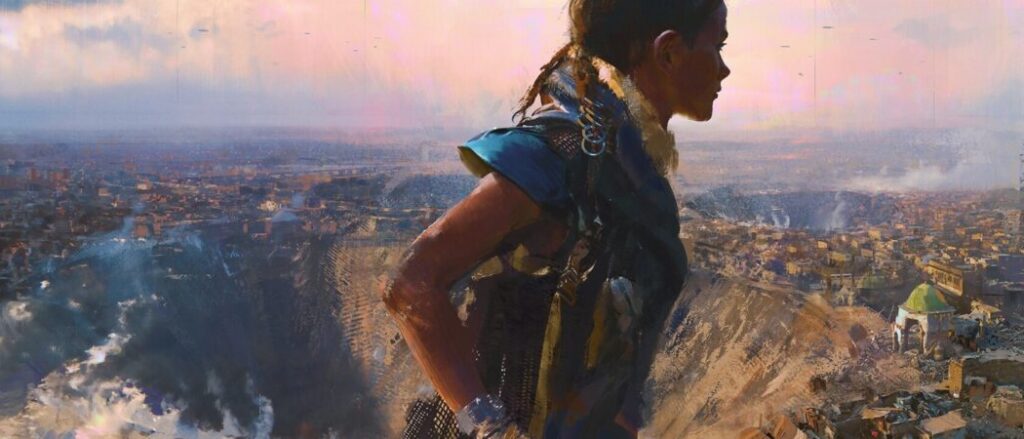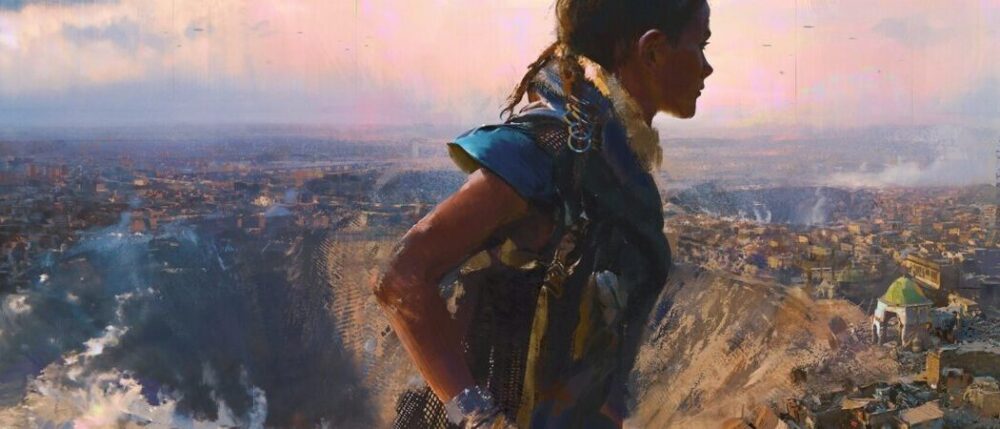by Giulia Abbate
English translation by Antonio Ippolito

Conflict is the starting point of narrative: without a conflict, there wouldn’t be a story to tell.
This principle applies to literature, hence to science fiction, hence to utopia (defined as sub-genre of science fiction, not in its original sense of “dispositif” in philosophy, although this kind of utopia, pre-existing to novelesque form, also plays out a conflict: as we will see later.)
Still, as of today thinking of a conflict in utopia seems hard. In these initial months of solarpunk.it, we often stumbled into a question from those who read us and comment on social networks, a question sometimes bordering on a statement: “What sort of conflict can ever occur in utopia?” And the statement was: “What a bore!”
So here we are, talking about conflict, in order to unravel doubts less tangled than they appear, and to give those about to write solarpunk some additional tool for reflection, discussion and work.
In juxtaposing “conflict” and “utopia”, two fundamental misunderstandings arise, one for each of these words.
Talking about “utopia”, the misunderstanding lies in thinking that Utopia should lay out on paper a world perfect under any point of view.
This is not the case: Utopia is rather “a world better than ours under certain points of view”. And this is enough to open so many directions for work, for instance by asking ourselves:which point of view?
In Romina Braggion’s novelette “Memorie di una ragazza interrotta”, we find a world deprived of the male gender, a scenario in the wake of feminist sci-fi writers like Charlotte Perkins Gilman and Joanna Russ, and which declares to be utopic.
Not everybody would agree, of course: so, part of the writing work in a story such as this one is to convince – narrating a certain plot and so triggering identification with the characters favored by utopia – that in a world of such a make someone might actually live better.
The explanation of the reasons why the imagined world would be better aims at opening our eyes on the wrongs of our time, where aspects “improved” in utopia are still terrible and really hurting.
Such a narrative might be perceived as a fiction with an aim, a cautionary tale. And indeed it is, as so much part of science fiction, dystopia included: with dystopia, we stretch a feature of our present time to its extreme, making it a major fixture of a world gone to seed, to summon attention on the criticism and to admonish that things should not be like that.
This proceeding is historically derived from utopia, where we improve something to prove it is necessary to work on it. Dystopia adds a strong fictional component, not required in traditional utopia.
As hinted before, the original philosophical utopia is something different and maybe something more than novelistic utopia: in the latter we are not supposed to build a system of values and a society/world alternative to the current one, as we are in philosophy: we work with fiction, with stories and a narrative: we really work with the same conflicts literature traditionally feeds upon.

And now we come to the second misunderstanding, the one about the word “conflict”.
In fiction, conflict is not necessarily a stark confrontation, dramatic and powerful, between good/bad characters; or an explosion of violence; or the fight of a lonesome character against an oppressive, totalitarian system bent on shredding him/her to pieces, a scenario to which much of the recent production of “dystopic fiction” has accustomed us.
Fictional conflict is a matter of dialectic: the dialectic between two different wills existing in the plot.
We can think of a protagonist and an antagonist, for instance. In the case of recent dystopia, the individual protagonist sets upon an antagonist system: and this is what leads many to think that, analogically, this cannot be done in utopia, because there is no system to set upon.
Again, this is not exactly the case.
Let us read a passage from “Fenice citoplasmatica” by Irene Drago:
“There is the revolución verde, of course, with its floral intuitions of bio-architecture, but there is also the accident at the Bushehr nuclear power plant in the Persian Gulf, and the genetic mutations it caused on living creatures. Andrea studied and collaborated with the best minds in biotechnology, Nobel prize-winning brains, and has now accepted a job in a cutting-edge division of medical research in Tehran, in the Second Islamic Republic. But all his knowledge and relationships, and all the means of advanced genetic engineering, seem powerless against the cancer that is about to eat his daughter alive. What is the solution, is there a hope?”
We have several conflicts here: the most evident one is sickness, and the response to oppose to it; the reference to an Islamic Republic leads us to imagine a cultural dialectic; there is the dilemma of a scientist father; and a nuclear accident which caused mutations in a world maybe more ecologically respectful than ours.
In the story “Nutopia” by Fambrini and Carducci, the plot is based on a rite of passage: in a fully green and solarpunk civilization, teenagers must face an important, I daresay existential, ordeal, to which they relate in different modalities. Before the suggestive description of the moment of the ordeal itself, moment which I personally found among the highest in the entire anthology, there are the personal ways to get there, among doubts and comparisons both in those who are about to “graduate” and their parents.
To me, these appear as pretty serious conflicts to work on, and supportive of my first disproof: utopia is not a perfect world, but a better world, where it is anyway possible to trigger dialectics and full-fledged character-system conflicts.
But in fiction, as we said, it is understood as “conflict” any confrontation of wills between two components of the plot.
From the Science Fiction Writing Handbook, in the paragraph dedicated to conflict:
“The main character has a goal, or a desire, but they cannot reach it immediately because someone or something is opposed; or a certain fact upturns a balance, and the characters must defend themselves from an external will. Conflict may be of a sentimental, economical, familiar, legal nature, etc.”
Here are some examples:
- A love story, troubled or contrasted by something: it is the case of “Solstizio” by Franco Ricciardiello, where the travel by bicycle of the main character, in a completely pacific, solarpunk world, is a way to review her love through flashbacks and to create an expectation: what will happen when the two lovers meet again?
- Some kind of investigation: utopia does not include absence of crime, but may have a different conception of idea of “crime”, as in the story “La prima legge” by Davide Del Popolo Riolo.
- An expectation: the short story “La semina” by Serena Barbacetto is completely centered on a project of the teenage character, who in silence and stubbornness “builds his endeavor”, obstacles notwithstanding;
- A mystery, not necessarily dealing with a crime or a “noir” scenario, but possibly referred to the worldbuilding itself: one follows the characters in an adventure and the same time the nature of the world they live in is revealed, using narrative reticence by degrees. It is the case of the story “L’ultima chance” by Silvia Treves, such a consummate narrator, who taking us by hand in the untangling of a dilemma manages to build gradually the world of the future: the unveiling of the context alone makes this a compelling reading.
- An accident or an actual, contingent problem: in “Nina and the Hurricane” by Ana Rüsche, one more young protagonist finds herself facing a hurricane in a moment where she’s already having a bad time, and cannot pay for herself the necessary technological protections. To a superficial reading, limited to the scenery, this might look like a dystopic story: but as we have seen, the presence of a character-system conflict is not specific of dystopia. In this case, the story points clearly to a possible, existing and near at hand solution, and revolutionary as well.
Maybe, sometimes, the real conflict is between us and our environment, drenched in a mainstream, one-way narrative heavily hindering our ability to roam with imagination and creativity. But this is not a problem with utopia, on the contrary: it is maybe the gist of the matter, the defect against which utopia actively works.
Let us think of classic utopias, those demonstrative travels to worlds which attain, if not perfection, the maximum possible perfection. Everything works, humankind has finally embraced that system of values which put an end to oppression and exploitation of any kind, allowing a new Eden. Where is a conflict in all this?
Conflict comes when we close the book. Conflict is out there, here and now.
A well done utopia is nor boring even when it is perfect, because it shatters our beliefs on what we believe unavoidable: by playing out a better world, better because different, it lifts Maya’s veil, that is the “creation” of the phaenomenic appearance surrounding us. And as science-fictioneers, we should work just for this; eventually proving, by the way, that “realism” is the most deceitful and sophisticated creation of imagination.
Good readings and good writings!

Comments are closed